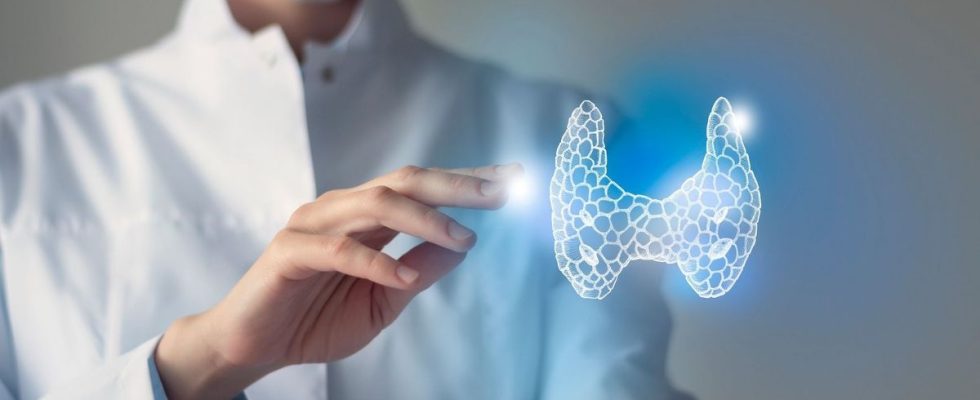Published on
Updated
Reading 3 mins.
Hypoparathyroidism is characterized by a deficiency in parathyroid hormone, which causes hypocalcemia and high levels of phosphorus in the blood. Rare, it is nevertheless fraught with consequences for patients. On the occasion of International Hypoparathyroidism Day on June 1, biotech Amolyt Pharma and the Hypopara France association want to raise awareness among the general public and health professionals.
Chronic fatigue, involuntary muscle contractions, brain fog, tetany attacks… Natalie’s life changed after her operation for thyroid cancer. Rid of the tumor, she finds herself suffering from a largely neglected invisible disease: hypoparathyroidism.
Hypoparathyroidism: a neglected disease
Approximately 80,000 people in the United States and 110,000 in Europe suffer from hypoparathyroidism, 80% of whom are women. In 75% of cases, patients underwent neck surgery (mainly thyroid). During this delicate operation, the 4 parathyroid glands as large as a grain of rice can be damaged or devascularized. In the majority of cases, the glands will resume their function within a few weeks or months. But in 2-4% of cases, hypoparathyroidism becomes permanent and is therefore called chronic.
Result: the parathyroid hormone that they normally secrete is no longer produced. Yet it is the key hormone for regulating blood calcium and it also participates in the regulation of the kidneys. To overcome this problem, treatment provides for the administration of large doses of calcium associated with active vitamin D. But these treatments often do not keep calcium levels in the blood stable for a long time, which leads to frequent and serious symptoms: calcium is associated with muscle and nerve function… patients are thus affected by attacks of tetany, permanent muscle pain, tingling, mental fog with memory problems, concentration and intense fatigue.
In addition, these treatments do not lower urinary calcium, which puts patients at risk for kidney disease.
Impaired quality of life and complications
In addition to these persistent and severe symptoms, patients often develop complications and comorbidities that affect their quality of life. Clinical manifestations vary and may involve many tissues and organs, especially the kidneys and bones.
17% of patients with hypoparathyroidism have osteopenia or osteoporosis and 53% are peri- or post-menopausal women who are at risk of developing osteoporosis Hypoparathyroidism causes abnormally low rates of bone turnover resulting in areas of bone thickening with an abnormal structure that may reduce elasticity and resistance to mechanical stress. Calcium supplementation and active vitamin D do not correct this abnormality in bone metabolism, leaving patients at risk of fractures over time.
It is also estimated that 26% of patients with hypoparathyroidism have chronic kidney disease or renal failure, supporting the therapeutic need to reduce urinary calcium excretion. The risk of long-term kidney complications is multiplied by 5 and 26% of patients with hypoparathyroidism have already developed chronic kidney disease.
More than 50% of patients with hypoparathyroidism are peri- and post-menopausal women
Still no hormone replacement!
The cause of the disease is therefore not a calcium problem but a parathyroid hormone deficiency, so why not replace it? Well, because we don’t have a synthetic hormone! Several biotech companies are working on a cure. Among them, Amolyt Pharma has developed a therapeutic peptide that acts on a parathormone receptor to induce a prolonged effect on calcium metabolism and thus control the symptoms of the disease. But despite encouraging results in a phase 2 trial, the arrival on the market of such a product for patients is still a long way off.
Raise awareness and recognize hypoparathyroidism
In the meantime, the association insists on the need to communicate about this invisible handicap so that on the one hand, patients can be identified and avoid a therapeutic wandering that is still too long, but also and above all so that the symptoms linked to this disease are better known and recognised.
“Too often, fatigue is equated with laziness, mental fog with the effects of age…“regrets Natalie Grosset, patient and founder and honorary president of the HypoPara France association.
She also reports a lack of knowledge among healthcare professionals: “Faced with fatigue, pain, tetany attacks… the link with the disease is not always made by health professionals, even if the situation is improving, in particular thanks to the action of associations“.
To learn more about this disease, the site https://hypopara.fr/ provides information.
